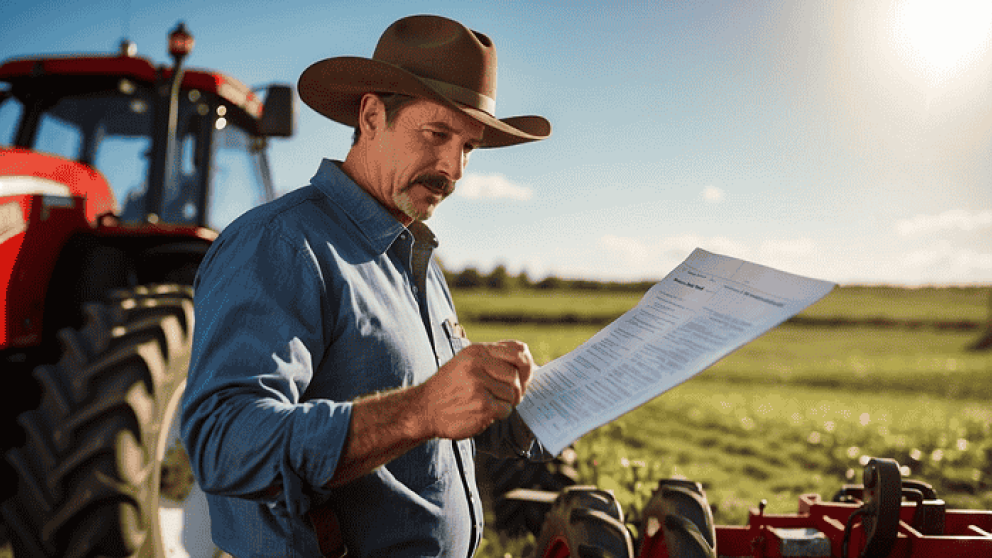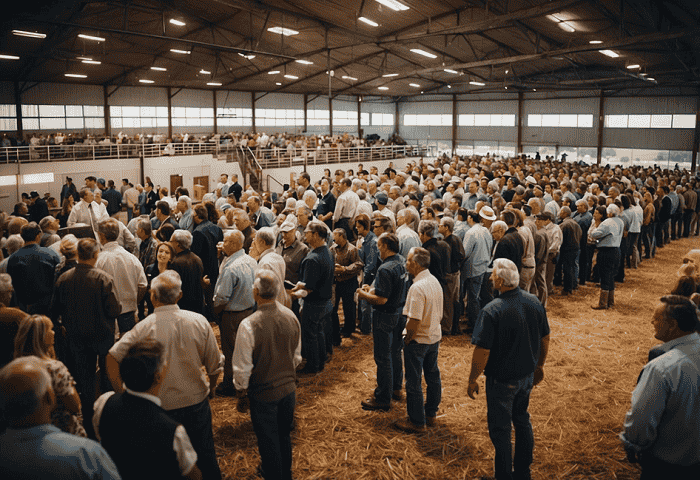10 Top Tips for Successful Farm Auctions to Maximize Your Profits and Efficiency

Farm auctions offer farmers great opportunities to buy and sell equipment. These events bring buyers and sellers together in one place, helping farmers get good deals on the tools they need.
Successful farm auctions need planning and smart choices. Buyers should know what to look for in used farm gear.
Sellers need to present their items well. Both sides can benefit from learning auction tips and tricks.
1. Inspect Equipment Thoroughly

Careful equipment inspection is key when attending farm auctions. Before bidding, examine each item closely.
Start by checking the machinery's overall condition. Look for signs of wear, rust, or damage. Pay attention to moving parts and check for loose components.
Engine inspections are crucial. Listen to the engine running and watch for unusual sounds or smoke. Check fluid levels and look for leaks.
Examine tires for wear and proper inflation. Test the brakes and steering to ensure they work correctly. Make sure all lights and electrical systems function properly.
Remember to check the equipment's serial number. This can help verify its age and specifications.
Ask to operate the equipment briefly. This hands-on experience can reveal issues that are not visible during a visual inspection.
If you're unsure about inspecting equipment yourself, bring along a trusted mechanic or experienced farmer. Their expertise can be invaluable in spotting potential problems.
2. Understand Market Value
Knowing the market value of farm equipment is key to successful bidding at auctions. Buyers should research current prices for similar items before the event. This helps set realistic expectations and budgets.
Online resources can provide pricing information on farm machinery. Local dealers may also offer insights on equipment values. Checking recent auction results for comparable items gives a good baseline.
Market trends affect prices. Economic conditions, crop yields, and new technology releases all impact equipment values. Staying informed about these factors helps buyers make smarter decisions.
Condition greatly influences an item's worth. Well-maintained machines typically fetch higher prices. Buyers should inspect equipment carefully to assess its true value.
Some items may sell for more or less than expected. Due to competition, auctions can drive prices above perceived market value. Being prepared for this possibility helps avoid overspending.
Understanding market value allows buyers to spot good deals and prevent them from paying too much for equipment. This knowledge is essential for making confident bids at farm auctions.
3. Set a Budget
Setting a budget is key for farm auction success. Before attending, decide how much you can spend on equipment or items. This helps avoid overspending in the heat of bidding.
Stick to your budget when the bidding starts. Determine the maximum amount for each item of interest. This should reflect the item's market value and condition.
Research the prices of similar items sold recently. This will give you a good idea of fair market value. Add a small buffer for unexpected costs like taxes or transport fees.
Remember that auction excitement can lead to impulse buys. Set budget safeguards to prevent buyers from spending more than they can afford.
If possible, bring the budget amount in cash. Some auctions offer discounts for cash payments, which can lead to savings on purchases.
Flexibility within the budget is smart. If one item costs less than expected, the money can go toward another needed item, maximizing the budget's effectiveness.
4. Check Auctioneer's Reputation

Before attending a farm auction, it is crucial to look into the auctioneer's reputation. A good auctioneer can make a big difference in how smooth and fair the auction goes.
Start by checking online reviews and ratings for the auction company. Look for feedback from past buyers and sellers. This can give you a good idea of what to expect.
Ask other farmers or people in the agriculture industry about their experiences. They might have valuable insights about different auctioneers in your area.
Find out how long the auctioneer has been in business. More experience often means they know how to handle different situations that might come up during an auction.
Check if the auctioneer is licensed and belongs to a professional organization. This can be a sign that they follow industry standards and best practices.
If possible, attend a few auctions run by the auctioneer. This will let you see how they operate, and their style suits you.
5. Review Lot Catalog Carefully
It is crucial to review the catalog thoroughly before attending a farm auction. This document lists all items up for sale and provides valuable information about each lot.
Farmers should pay close attention to equipment specifications, including make, model, year, and condition. This helps them identify potential bargains and avoid bidding on unsuitable items.
The catalog often includes photos of the lots. These images can give buyers a better idea of the item's condition and help them decide if it's worth bidding on.
Downloading the catalog in advance allows farmers to research market prices for similar items. This knowledge helps them set realistic bidding limits and avoid overpaying.
Some catalogs may include additional details, such as maintenance records or known issues with equipment. These details are invaluable for making informed decisions during the auction.
6. Know Bidding Rules
Farm auctions have specific rules that bidders must follow. These rules can vary between auctions and auctioneers, so it's crucial to understand them before participating.
Many auctions require registration before bidding. This often involves providing identification and contact information. Some may ask for a deposit or proof of funds.
Pay attention to the auctioneer's instructions. They will explain how to place bids and signal your interest. Auction etiquette is important for a smooth process.
Bidders should be aware of any buyer's premiums. These additional fees added to the winning bid amount can significantly impact the final price.
Some auctions have reserve prices. These are the minimum amounts the seller will accept. If bids don't reach this price, the item may not sell.
Familiarize yourself with payment terms. Know when payment is due and what forms are accepted. Some auctions require immediate payment, while others allow a grace period.
Understanding these rules helps bidders avoid mistakes and bid confidently. It also ensures a fair and efficient auction process for everyone involved.
7. Take Notes During Auction

Bringing a notepad and pen to a farm auction is a smart move. Write down important details about items you're interested in. This includes the lot number, item description, and condition.
Jot down the starting and final bid prices for items. This will help you track market values and your spending. Keep a running total of your purchases to stay within budget.
Note any questions you have about specific items. You can ask the auctioneer or seller later. Write down the terms of sale and payment methods accepted.
Record contact information for the auction company and sellers. This is useful if you need to follow up after the auction. Make notes on delivery or pickup details for items you win.
Sketching diagrams or measurements of equipment can be helpful. This ensures items will fit in your space back home. Writing things down also gives you time to think before bidding.
Good notes also serve as a reference for future auctions. They help you remember what worked well and what to do differently next time.
8. Network with Other Farmers
Farm auctions are great places to meet other farmers. Talking to them can give you useful tips and info. You might learn about good deals or equipment to avoid.
Farmers often share their experiences with different machines. This can help you make smart choices when bidding. They might also tell you about upcoming auctions you didn't know about.
Building connections with other farmers can lead to future opportunities. You might find someone to trade equipment with or help during busy seasons. These relationships can be valuable long after the auction ends.
Don't be shy about introducing yourself. Most farmers are happy to chat and share advice. Ask about their farms and what equipment they use. This can give you ideas for your operation.
Remember to bring business cards if you have them. Exchange contact info with farmers you click with. You never know when these connections might come in handy.
Networking is about more than just getting help. You can also offer your knowledge to others. Sharing what you know can build goodwill in the farming community.
9. Tour the Farm Premises
Visiting the farm before the auction is a smart move. It gives buyers a chance to see the property and equipment up close. This helps them make better decisions on auction day.
During the tour, examine the condition of buildings, fences, and land and check for needed repairs. This information can help buyers set their bidding limits.
Farm auctions often include machinery and tools. Take time to inspect these items carefully. Note their age, wear, and any maintenance issues.
Ask questions about the farm's history and production. This can give insight into the property's potential and reveal any challenges the new owner might face.
Taking photos or videos can be helpful. These can be reviewed later when making bidding plans. They can also serve as a reference during the auction.
Remember to respect the current owner's privacy and property. Follow any rules or guidelines set for the tour. Being courteous can lead to useful conversations with the seller or auction staff.
10. Ask for Maintenance Records
Asking for maintenance records when buying farm equipment at auction is crucial. These documents provide valuable information about the machine's history and condition.
Maintenance records show how well the previous owner cared for the equipment. They can reveal regular servicing, repairs, and part replacements. This helps buyers assess the machine's overall health.
Checking maintenance records can uncover potential issues or recent fixes. Buyers can use this info to make smarter bidding decisions. It also helps them plan for future upkeep costs.
Not all sellers keep detailed records, but those who do often have better-maintained equipment, which can be a good sign for potential buyers.
If maintenance records aren't available, buyers should ask why. They can also request that the equipment be inspected closely before bidding. This helps them spot any signs of wear or neglect.
Asking for maintenance records is a smart step in the auction process. It gives buyers more confidence in their purchases and helps them avoid costly surprises later.
The Farm You’ve Been Waiting For Won’t Wait for You—Secure It Today
Don’t let the farm of your dreams slip away. At Underwood Land Company, we offer exclusive access to the finest farm properties across the states we serve.
Whether you’re looking to buy through our detailed listings, participate in a competitive auction, or explore hidden opportunities not yet on the site, we have you covered. Our strong connections with top land brokers ensure you get the best options available.
Stay ahead by downloading our app and never miss out on an auction. Reach out today—before someone else claims the land you’ve been waiting for.
Frequently Asked Questions
What preparations should I make before attending a farm auction?
Research the auction house and items for sale. Make a list of equipment needed and set a firm budget. Arrange transportation for any large purchases. Bring cash or secure financing in advance.
What are some effective bidding strategies for farm auctions?
Start bidding low and increase slowly. Stay calm and stick to your budget. Watch other bidders to gauge interest. Consider bidding on less popular items to get better deals.
How can I thoroughly research farm equipment before an auction?
Check online listings for detailed item descriptions and photos. If available, ask the auction house for maintenance records. Talk to other farmers about their experiences with similar equipment.
What are the key factors to consider when setting a budget for a farm auction?
Look up recent sale prices for similar items—factor in repair costs for used equipment. Consider how the item will improve farm productivity. Leave room in the budget for auction fees and taxes.
How can I avoid common pitfalls when participating in farm auctions?
Don't get caught up in bidding wars. Avoid impulse purchases. Carefully read all terms and conditions. Be wary of equipment that seems too good to be true.
What post-auction steps should I take after winning a bid at a farm auction?
Pay for and collect items promptly. Arrange proper transportation. Keep all paperwork for tax and insurance purposes. Test equipment as soon as possible to ensure proper function.



